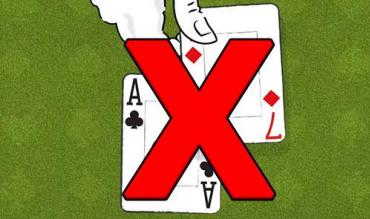The first step in playing blackjack is to use the correct basic strategy and the deviations to from that strategy based on the ratio of cards that remain. Soft 18 in blackjack (A-7) is a commonly misplayed hand. Here we are going to take a look at some common errors seen in civilians and beginning advantage players.
SOFT 18 VS. DEALER'S 2 UPCARD
Soft 18 is a complex hand for people to grasp. Like all things in gaming the first instinct of player is often counter intuitive to the hard mathematical proof. The first misconstrued notion of the soft 18 total is that the rules of the game you are playing impact some of the playing decisions of basic strategy. That is the strategy that on should adhere to if they were not keeping track of the cards played. For a 2 deck game whether or not the dealer hits or stands on a soft 17 impacts a few of the decisions the player will encounter. The decision the player faces when they hold the A-7, that is most misplayed, is when the dealer is showing a 2 up card.
The reason is that when the rules dictate that the dealer must hit on a soft 17 the correct play is for the player to double the original bet. In the case where the dealer is bound by the rules to stand on a soft 17 the correct play is for the player to stand against the 2. This is why the player has to be aware of the rules of the game before sitting down to play. In both cases the correct play gives a negative expectation of negative 12.17%. So for every dollar wagered the player will lose 12.17 cents. Playing the hand wrong increases the negative expectation to over 13%. This means losing more money, which is opposite of what the advantage player seeks to do.
SOFT 18 VS. DEALER'S 7 UPCARD
Another common mistake that the aspiring player needs to be aware of is when the player holds an A-7 against dealer up card of a 7. In both cases when the dealer is bound by the rules to hit on a soft 17 and where the dealer has to stand on a soft 17 the correct play is to stand pat on the hand. The plays are again specific to the double deck game. But they can be extrapolated to the six, eight and continuous shuffle machine (CSM). The CSM games should be avoided at all cost. The aggressive player will be tempted to double the hand. This is a bad play for a couple reasons. First, the player is sitting on a total of 18 and because there are four times as many 10 valued cards per deck than any other card in the deck then there is a greater chance that the dealers under card will be a 10 value card. From a pure mathematical perspective the expectation gained from playing the hand correctly is positive 39.96%. For every 1 dollar wagered the player will win approximately 40 cents. Misplaying the hand drops that expectation below 35 cents or 35%. This is still a positive expectation but it’s a loss of a few percent. And not playing the hand correctly lowers the amount of money we might win.
The correct play for an A-7 against a 7 is defined in the previous section. In both cases the correct play is to stand. But because blackjack is dynamic and it's a game of shifting percentages, there are times when the player is mathematically justified to double the A-7 against a 7. This is justified when the there are ironically 14 more 10s per deck than low cards. This translates to a +14 count using the simple high low count or a +22 count using the Uston APC count. Adhering to this translates into a significant jump in EV for this playing decision.
These are some common mistakes seen for the A-7 hand. The astute player needs be aware of these common errors. Being aware of the errors might aid the player to win some hands in blackjack.


